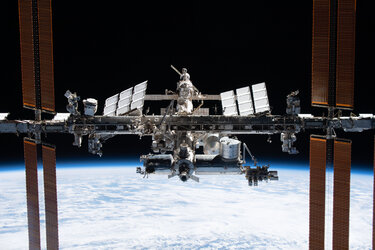N° 34–2012: Call for Media: ESA Council meeting at ministerial level
15 October 2012
The objectives and priorities for Europe in space will be discussed at the Council at Ministerial Level in Caserta, Italy on 20–21 November.
Ministers in charge of space activities within the 20 ESA Member States and Canada will meet to decide on a plan for pushing knowledge, supporting an innovative and competitive Europe and enabling space-based services.
In line with achieving its mission objectives, ESA is attracting increasing political interest. With Poland joining by the time of the Ministerial Council, ESA will have 20 Member States, compared to 18 in the last Ministerial Council in the Hague, Netherlands.
ESA also has Cooperation Agreements with nine of the ten other Member States of the EU that are not yet members of ESA. They will attend the Ministerial Council. Canada takes part in some ESA programmes under a Cooperation Agreement.
Several observers have also been invited to be present at the Council: Bulgaria, the only remaining EU Member that has not concluded a cooperation agreement with ESA; the organisations Eumetsat, the European Science Foundation, the European Defence Agency and the European Maritime Safety Agency and the EU.
The meeting will be held in the Royal Palace of Caserta, Viale Giulio Douhet 22, 81100 Caserta.
The Press Centre is located in the residence of the High School of Public Administration adjacent to the Royal Palace.
Media wishing to attend must be accredited by 5 November. To obtain a personal access badge, the passport or national ID card listed on the accreditation form must be shown. No other means of identification will be accepted. For accreditation, please fill out the form at:
http://www.esa.int/esaCP/SEMICBGYD7H_index_0.html
A limited number of rooms are available for media covering the event in the Press Centre building. The price is €43 per night, breakfast and local taxes included. These rooms will be allocated on a first-come-first-served basis. Requests for rooms should be made using the accreditation form.
A background note covering the objectives and programmatic aspects for debate and tabled for discussion will be issued by early November.
Provisional press programme
Please note that the proceedings are not open to media.
Monday, 19 November
14:00–19:00
Opening of Press Centre & accreditation formalities
Tuesday, 20 November
08:00
Opening of Press Centre & accreditation formalities
08:45–09:00
Opportunity for photographers to be in the conference room
09:00
Council meeting at ministerial level starts (not open to media)
11:15
Press briefing: introduction to the Council deliberations
12:45
Official group photo of Ministers (for professional photographers only)
13:00
Lunch break
15:00
Meeting resumes
18:00
End of meeting followed by press briefing
Wednesday, 21 November
08:00
Opening of Press Centre
09:00
Meeting resumes (not open to media)
12:30 or 17:00
Expected end of meeting, followed by a press conference with the ESA Director General and the Chairs of the Council at ministerial level.
20:00
Press Centre closes
All requests for interviews should be addressed to ESA Media Relations at the Press Centre.
About the European Space Agency
The European Space Agency (ESA) is Europe’s gateway to space.
ESA is an intergovernmental organisation, created in 1975, with the mission to shape the development of Europe’s space capability and ensure that investment in space delivers benefits to the citizens of Europe and the world.
ESA has 19 Member States: Austria, Belgium, the Czech Republic, Denmark, Finland, France, Germany, Greece, Ireland, Italy, Luxembourg, the Netherlands, Norway, Portugal, Romania, Spain, Sweden, Switzerland and the United Kingdom, of whom 17 are Member States of the EU. Poland will join as a full Member State by the next Council at Ministerial Level.
ESA has Cooperation Agreements with nine other Member States of the EU and is negotiating an Agreement with the one remaining (Bulgaria). Canada takes part in some ESA programmes under a Cooperation Agreement.
By coordinating the financial and intellectual resources of its members, ESA can undertake programmes and activities far beyond the scope of any single European country.
ESA develops the launchers, spacecraft and ground facilities needed to keep Europe at the forefront of global space activities.
Today, it launches satellites for Earth observation, navigation, telecommunications and astronomy, sends probes to the far reaches of the Solar System and cooperates in the human exploration of space.
Learn more at www.esa.int
For further information:
ESA Media Relations Office
Tel: +33.(0)1.5369.7299
Fax: +33(0)1.5369.7690















 Germany
Germany
 Austria
Austria
 Belgium
Belgium
 Denmark
Denmark
 Spain
Spain
 Estonia
Estonia
 Finland
Finland
 France
France
 Greece
Greece
 Hungary
Hungary
 Ireland
Ireland
 Italy
Italy
 Luxembourg
Luxembourg
 Norway
Norway
 The Netherlands
The Netherlands
 Poland
Poland
 Portugal
Portugal
 Czechia
Czechia
 Romania
Romania
 United Kingdom
United Kingdom
 Slovenia
Slovenia
 Sweden
Sweden
 Switzerland
Switzerland


























